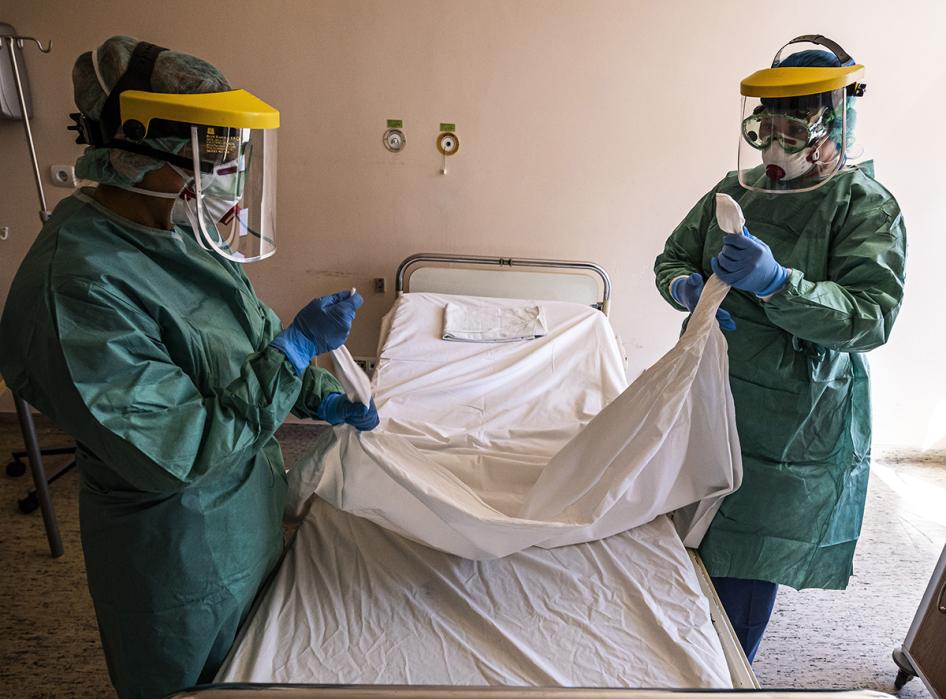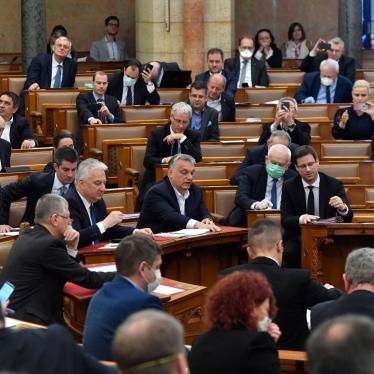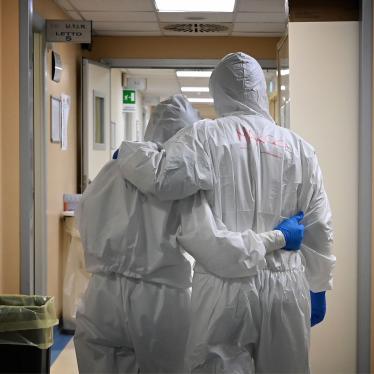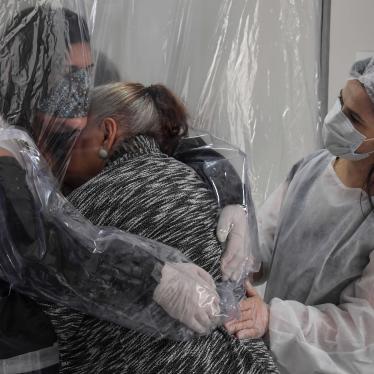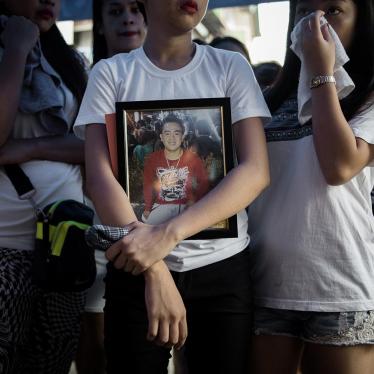Countries around the world are at various stages in addressing the Covid-19 pandemic, and yet they face two common challenges. During the crisis, they need to uphold and protect the right to health, including access to health care for everyone. And, looking to the future, they need to identify ways to “build back better”, as the United Nations secretary-general, António Guterres, has put it: to provide conditions that better protect citizens’ rights and the impact of future pandemics.
Some governments have worked hard under new and difficult circumstances to meet the first challenge: expanding testing, isolating confirmed cases, tracing contacts, and ensuring that the severely ill get treatment, while continuing to provide other essential health services.
Restrictions on movement and gatherings, including shutting businesses, have mainly been introduced with clear time limits and parliamentary oversight. Human Rights Watch (HRW) and others have urged governments to protect at-risk groups, such as people who are older, have disabilities, and have underlying medical conditions.
It is vital to protect people in prisons and immigration detention centres, who are in crowded and often unhygienic conditions. Health and other essential workers on the front line need protection and support.
One feature that cuts across many countries, though, is that the pandemic has highlighted, even reinforced, inequality and disadvantage that existed before the crisis.
Women have, in many ways, been hardest hit: they are disproportionately represented in insecure and often low-wage jobs, including health and social care, domestic work, and shops and services that have been vital during the pandemic. They have taken on a greater share of care-giving and household responsibilities. Governments should ensure that the reopening of workplaces is co-ordinated with the reopening of schools and childcare, so that care-givers do not miss out on jobs.
Women and children have faced an elevated risk of domestic violence under lockdowns. Many women in Kyrgyzstan, Central Asia, for example, have found it harder to call help centres as “their abusers are at home 24 hours a day controlling their every step,” Tolkun Tulekova, who leads an association of crisis centres, says.
In the UK, where a survey of groups helping domestic-abuse survivors showed that three-quarters had reduced services, the pandemic has exacerbated inequalities in services for migrant and black and minority-ethnic women. Governments should ensure access to life-saving services for all survivors of violence, both during and after the pandemic.
The surge in demand at foodbanks, in the UK and elsewhere, exposes fault-lines between the rich and poor. Some governments in both affluent and developing countries have created emergency welfare safety nets. In the UK, Human Rights Watch research shows that a government-commissioned voucher scheme to replace free school meals has been plagued with problems. Charities and schools have had to plug the gap with donated food, and even incur debt to buy necessary supplies. The approaches taken in Wales, Scotland, and Northern Ireland have been more effective.
The global economic effects of the pandemic are likely to worsen food insecurity, poverty, and inequality, unless governments and the IMF target economy-recovery programmes at supporting the hardest hit.
Other governments have used the pandemic to tighten their grip on power. Azerbaijan has arrested activists and opposition figures who questioned the government’s handling of the crisis. Turkey has started criminal investigations against doctors and medical associations for raising concerns.
The Prime Minister of Hungary, Viktor Orbán, who leads an increasingly nationalist and authoritarian government (Comment, 5 October 2018), adopted emergency powers that enabled his government to pass decrees that have little to do with tackling the virus; steps linked to health care appear to have caused more suffering.
Athina Nemeth, a paramedic and volunteer home-care-worker in Budapest, told us that some people she cared for who required round-the-clock help were abruptly discharged when the authorities cleared beds for Covid-19 patients. Several died. The Hungarian Parliament voted this month to remove the emergency powers, though local NGOs said that associated legal steps meant that Mr Orban’s powers had actually been strengthened further.
The pandemic has, in many countries, reinforced deep-rooted patterns of discrimination against minorities, including religious communities and people of Asian descent. The Equality and Human Rights Commission in the UK has opened an inquiry into the disproportionate impact of the virus on ethnic minorities, owing to “structural race inequality”. In India and Sri Lanka, hate speech against Muslims increased. In response, a World Health Organization (WHO) spokesman urged authorities not to assess cases “on . . . racial, religious, and ethnic lines”.
Competition between countries for medical equipment and protective clothing, the closing of national borders, and the varied strategies to respond to the virus have underlined the dominance of national approaches over international co-operation.
Despite this, the UN, the European Union, and other international organisations have pushed for greater co-operation. In that context, Mr Guterres’s call to “build back better” is part of multilateral efforts to contain the virus, and save lives and livelihoods.
In May, the World Health Assembly of the WHO adopted a resolution urging international collaboration to develop “affordable diagnostics, therapeutics, medicines, and vaccines for the Covid-19 response”, including voluntary pooling and licensing of patents. Since then, dozens of governments have joined a call to share relevant “knowledge, intellectual property, and data” between states.
More international co-operation is needed on many issues, including the environment and climate change, and the use of technology.
The earth has undoubtedly been given a breather in recent months. The rate at which greenhouse gases are emitted has fallen; but their level in the atmosphere is still at its highest ever.
The massive economic recovery programmes, especially in Western countries, are an opportunity to ensure that the recovery from the crisis is greener and more sustainable. A rapid international transition from polluting fossil-fuels, such as coal and oil, to cleaner energy sources, such as wind and solar, is crucial to slowing climate change.
Some governments have shown positive commitments; others have not. Brazil, the United States, and other countries have worsened the situation by weakening or not enforcing environmental regulations during the crisis. Germany, on the other hand, despite intense lobbying from the motor industry, refused to include subsidies for petrol and diesel-driven cars in its recovery package, opting to support electric cars and other environment-friendly initiatives.
On technology, the contact-tracing apps that are being rolled out in some countries come with potential pitfalls. A key measure of their effectiveness will be whether a large number of people willingly use them – which they are unlikely to do unless they feel that the government is respecting their privacy rather than using the app as a pretext to monitor them.
In Russia, an obligatory app proved to be flawed, highly intrusive, and effectively an addition to the government’s arsenal of surveillance tools.
More broadly, such tech-based solutions could distract from proven methods for protecting vulnerable groups during a pandemic, such as ensuring access to hygiene and expanding access to accurate testing and treatment. And they may reinforce the digital divide caused by poverty and discrimination. Even governments committed to protecting privacy in the use of such apps need to ensure that they do not entrench existing patterns of disadvantage. Greater sharing of best practice is needed.
The UN is urging governments to boost co-operation. Germany plans to refocus its six-month presidency of the EU, starting next month, on building capacity to recover from the pandemic in Europe. Such efforts will deliver effective results only with greater political will to find common ground between countries, and support for those most affected by the pandemic.

